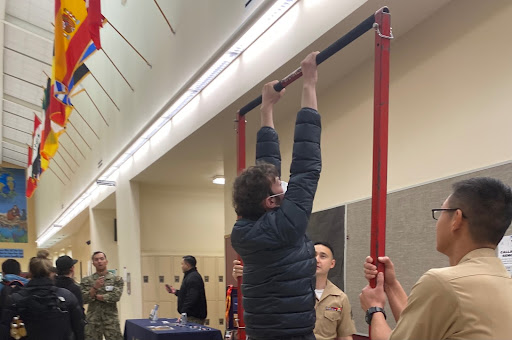
The MIHS administration should stop glamorizing military recruitment and present alternative career and education opportunities with equal exposure.
According to the American Civil Liberties Union (ACLU) of Washington, military recruiters must be given the same access to high school campuses as other occupational and educational advisers. However, MIHS hasn’t advertised employers or colleges in the Commons this school year, so it is not required to allow military recruiters.
Associate Principal Nick Wold argues that there are many benefits of allowing military recruiters on campus.
“A lot of times, [recruiters] do service work in our community and try to give support to students that need volunteer hours,” Wold said. “Sometimes, it is for students that want to have a different career path or it’s in their family and they build a relationship with the recruiter.”
While joining the military may be an ideal path for some students, military recruiters do not accurately represent the lifestyle necessary for such a career. For instance, recruiters often utilize a pull-up bar to appeal to the competitive spirit of high school athletes, but fail to address the potential dangers of life in the military.
“I think it’s pretty common knowledge that physical fitness is a part of the military, so I don’t see it being a glamorous thing to do a pull-up or push-up,” Wold said. “I think it’s just a part of the recruiting approach and an added layer to tell people there’s a physical fitness expectation for people who were to join.”
However, Wold also stated, “It could just be a way to have fun. Me and my friend walk past and a recruiter says, ‘Hey, you guys want to do a couple pull-ups against each other?’ and these are two people that compete in video games, the mile or push-ups.”
The use of fun is precisely what I find problematic: recruiters utilize tactics such as the pull-up bar to portray war as if it is a game. In fact, the Army began recruiting through video game tournaments in 2018 after it did not meet its quota for the first time in 13 years.
Wold admits that recruiters do not present a comprehensive view of a life in the military. “There’s a lot of stuff that comes out of the military experience, some things that are really sad and scary; people have come home and hurt themselves and hurt others,” Wold said. “A recruiter may not give that full glimpse when they’re talking to a high school senior about where they’re going to go in the next stage of their life. I think they probably present the opposite side of that argument: a sense of family, a unit that cares for you. I imagine that’s their strategy, talking about those things rather than the negative sides of combat.”
While it is understandable that recruiters emphasize the positive aspects of what they are promoting, MIHS has a responsibility to make sure students are aware of the consequences of enlisting. The MIHS administration claims to prioritize mental health by smothering students with videos about depression and anxiety in Islander Hour, but the military experience as Wold describes it does not align with these values.
According to a paper from the U.S. National Library of Medicine, young soldiers experience a higher number of mental disorders and suicides. In addition, recruiters at MIHS frequently wear shirts stating “Pain is weakness leaving the body.” When asked if this aphorism aligns with our school’s values, Wold responded, “Yeah, probably not.”
Students may also be incentivized to join the military to eventually go to a university. A 2017 poll from the Department of Defense shows that 49% of survey respondents indicated that if they were to join the military, a reason for doing so would be to pay for future education. This particularly affects students lacking financial stability. However, MIHS does not display alternative ways for students to apply for financial aid in the Commons, such as the Free Application for Federal Student Aid program.
Shifting COVID-19 guidelines have made it easier for the military to visit schools compared to other post-high school programs such as colleges.
“[Colleges] set their schedule of when they’re going to come to the Northwest, and when they’re going to come to Western Washington,” Wold said. “When we started the school year, we weren’t having visitors or volunteers. We now allow for people to come on-campus. If these people had a branch similar to our naval service or army service, then they could very easily come into our building, so that’s the challenge.”
Thus, I believe the administration could reach out to other organizations, such as the Peace Corps, to display their work in the Commons alongside the military so students are made aware of all potential pathways. However, the school has not proactively sought presenters in the past.
“Typically, we’re not the ones doing the recruiting,” Wold said. “We’re the ones that have to turn people away because we get so many people wanting to come to Mercer Island.” Administrators can also discuss appropriate methods (and clothing choices) with recruiters to better align with the school’s values.
Students and staff: while military recruitment continues to take place at MIHS in its current form, make sure loved ones are aware of the wide range of opportunities for students to serve their communities and attain financial aid for higher education. No one should have to play Russian roulette for their livelihood.









Arman Najafian • Jun 12, 2022 at 2:55 pm
this is really interesting Kyle! I myself have participated in these competitions and never realized the marketing campaign behind them!
Zoya • Jun 3, 2022 at 1:12 pm
Amazing article Kyle, and I completely agree. The military recruitment is overly glamorized and shown off, especially since they are positioned right in front of the school.
Julia Hauge • Jun 1, 2022 at 3:37 pm
Great article Kyle! This is not talked about enough. There are plenty of opportunities other than the military for students who do not seek higher education, but the school fails to advertise them.
Betty • May 22, 2022 at 2:39 pm
very interesting kyle!